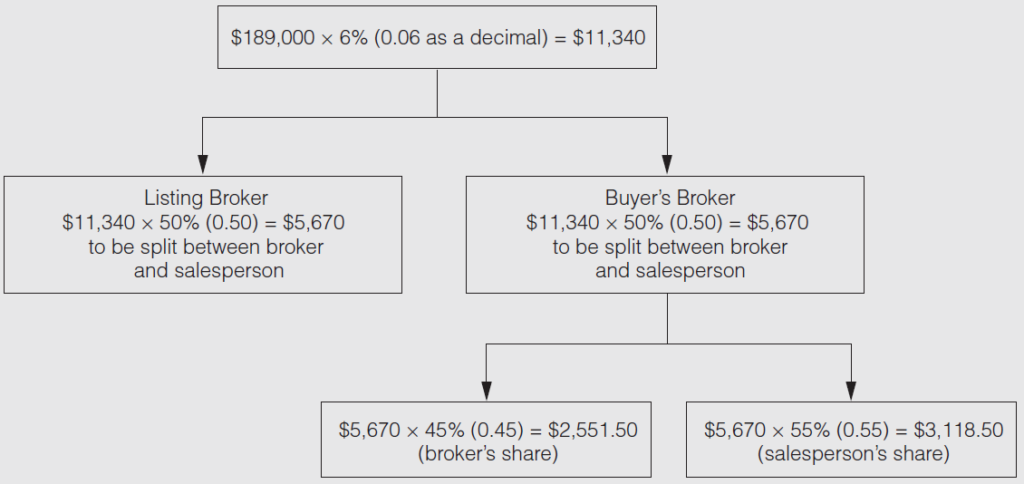Initial Consultation
Without a need for a fancy introduction let’s go through what you should expect from your first meeting with an agent.
Let’s assume that you are in the market to find your first home. While you were doing some window shopping you came across a broker’s office. You immediately remembered the home you saw online last night. You made a snap decision and walked in. Since this is your lucky day the agent immediately called the seller’s agent to make an appointment to show you the property. Without giving you Consumer Notice and explaining the importance of a written agency agreement; the agent drove you to the house. Through the actions of this agent and lack of information, you think you are being represented.
Please note that there is a big difference between the level of services that an agent delivers to a client and those services that the agent offers to a customer. As a consumer, you have every right to know the difference.
Time for some history lesson! The relationship that you have with your agent has evolved from the master-servant relationship under English common law. In that relationship, the servant owed complete loyalty to the master. The loyalty substituted the servant’s welfares as well as any loyalty the servant might owe to others.
In today’s world, the agent owes you similar loyalty and other duties regardless of which services that you get, the agents are required to disclose all the relationships permitted by state law so that you are aware of your rights and options. This disclosure is provided in the Consumer Notice and it should be handed to you at the initial contact.
Also, the agent is entrusted with certain confidential information to the client. In contrast, any third party is the customer who is entitled to truthful material and fair and honest transactions as a consumer but does not obtain guidance and direction or confidential information about the principal. Essentially, the agent supports and protects the client’s benefits, not the customers.
So, what does this mean? If we circle back to our scenario above, it means that you are not represented legally when the agent shows you the property. Please note that you should be very cautious about which information you share without first receiving the Consumer Notice and forming an agency relationship. Be aware that you might be relaying personal information to a professional who might never become your agent. You probably do not want the seller to know how motivated you are and how much you are willing to pay to close the deal! As always, everything is negotiable in real estate and it is a must for you to learn different types of agencies and their concepts during your initial consultation.
Once you learn about these agency agreements, you can authorize your agent to act on your behalf. The agent’s fiduciary relationship of trust and confidence means that he or she owes you certain duties. Please do not assume that these duties are simply moral or ethical, they are common law.
Congratulations on deciding to buy a home and working with an agent! It almost feels like a big weight has been lifted on your shoulders. To give you good news, the fun only started.! The most important question for our initial market search: What do you need and want from a house?
Of course, some things are obvious, you will need a safe structure such as a roof and on-site amenities such as hot water. Some needs would be unnegotiable such as your budget, you might want to stay within a certain range and not consider anything else that is the contrary. However besides certain things, when the home buyers think about purchasing their dream home most of them have vague ideas. The agent must investigate your needs (the musts that you cannot or prefer not to live without) and the wants (nice to have).
Some useful questions to have a general idea of could be the importance of the location: do you need a house in the city near work or do you prefer a gated community? Another useful question would be the space: how many rooms you need and what would be the type; loft, sunroom, basement, master bedroom, extra storage? Are you thinking of expending your family and will need a yard soon? It is always good to think ahead of time in case your lifestyle might change…
When it comes to the needs, a good buyer should keep in mind when you and your realtor search for homes in your price range and location preferences you might need to adjust some of your needs. You might need an extra room for home-gym but might change your mind later and decide to convert some part of the basement.
The wants are the icing on the cake. Once you fulfill your needs the best way you can., then you start taking into account the wants. Do you want granite counters, a farm-style sink, French doors, a wet bar, or a jacuzzi? Please note that if you decide to sell your house in the future some wants such as a pool might not be attractive in some locations or some amenities such as energy-saving features might add value.
Who doesn’t love a good deal or save some sweet money? Imagine all the money you could have instead of paying for the closing costs, mortgage interests as well as agent fees! Believe me, I am all about ROIs and making the best bang for my buck.
As we all know, real estate investment is typically the biggest investment we make therefore at this point it is only natural to have some serious questions. You might be wondering what % the real estate service fees will cost and who will be responsible for paying the commission. You might also ask yourself if these will be included under closing costs. Before I ease all your wonders, just keep in mind that to get the best bang you will have to work with an agent with a strong work ethic. Your agent may not perform solely on self-interest and compromise the top-sale by focusing on just commission. The responsibility of being an agent requires to place the client’s interest above those of all others. So it means your agent should negotiate until the end instead of choosing the easy way and settle for the first offer!
How much is agent commission and who pays for it?
Before jumping into commission details, your agent will go through their services and plans to shine your property and show the value they can bring in the transaction. To represent you better they will need your signature on the buyer agency contract. However, you must go through several discussions before signing it.
Think about it as your chance to interview the agent and see what kind of prospects they can propose to you. Once your agent explains the forms of agencies available and the parties’ rights and responsibilities under each type, the broker services should be clarified. Also, the agent should explain their broker’s policy regarding contacts with other parties who might be involved in the escrow; for instance, if the hiring broker also represents the seller and if the company’s policy includes the appointment of designated agents. ( please read here to learn why you should avoid dual agency)
Once you have a clear idea of the services and marketing efforts, it is time to discuss the compensation topics. Buyer agents are normally compensated by the seller broker sharing the commission paid by the seller. You can think of this commission as marketing efforts sellers are willing to pay to have a broader influence in the market.
However, buyers’ agents may be compensated in the form of a flat fee for services, an hourly rate, or a percentage of the purchase price. The agent may entail a retainer fee at the time the contract is signed to conceal initial costs. The retainer may be applied as a credit toward any fees due at the closing. As always, a written document will provide you the proof you expect the agent to do, which is particularly important you need to take legal action.
As in any agency agreement, the foundation of compensation does not govern the relationship. In other words, the buyer’s agent may be compensated by either the buyer or the seller. Compensation is always negotiable.
What do realtor fees cover?
Let’s say the seller is paying for your agent, yay! Do you still wonder how much your agent will get out of this deal? Most agents do not take the full commission to home. You might not know but your agent is a self-contractor meaning they cover their own costs. To name a few, they will pay for the overhead, an assistant, advertising expenses, federal taxes, social security, healthcare, and state taxes.
If you are still curious, let’s do some math!

Let’s say you purchase your house for 189K and the listing broker commission is %6. If the listing broker agreed to share half of his commission with the buyer broker and the buyer agent gets %55 of each closed transaction, how much does your agent earn?
Explain the market condition
After going through all steps explained above, your agent should inform you next on how to evaluate the properties in terms of price so that you get the best deal with the fastest results.
Naturally, you will not want to overpay for any property. Your agent should plan on preparing a comparative market analysis (CMA) to assist you in making an appropriate offer. The buyer’s CMA should include recent sale prices of similar properties in the same general area. The recently sold homes will show you how much other buyers were willing to pay for comparable homes. CMA will also give you an idea of how much loan lenders lend when they make the lending decision. It may also include homes that were listed that did not sell, meaning the sales price the buyers were unwilling to pay.
Ultimately it will be up to the seller to decide the market sale price but your agent should help you realize the significances of setting a price that is considerably overstated or brutally out of line with the CMA or appraisal.
If you are in Pennsylvania or New Jersey area, please contact me to learn more about what you should be paying for your perfect house!




